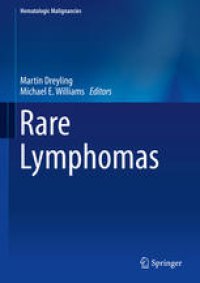
Ebook: Rare Lymphomas
- Tags: Hematology, Oncology
- Series: Hematologic Malignancies
- Year: 2014
- Publisher: Springer-Verlag Berlin Heidelberg
- Edition: 1
- Language: English
- pdf
After a decade of tremendous progress in the diagnostic and therapeutic approaches to malignant lymphoma, optimal treatment strategies are now based not only on accurate diagnosis but also on thorough evaluation of clinical and molecular risk factors. Even more importantly, molecular targeted approaches have been shown to be effective in the treatment of distinct lymphoma subtypes. Against this background, clinical management of especially the rare lymphomas remains a challenge for the general oncologist. This book provides a comprehensive overview of current treatment strategies in these rare lymphoma subtypes. Experts in the field from around the world describe histomorphology in a clinically relevant manner, consider the role of risk factors in detail, and discuss the spectrum of therapeutic approaches. Special emphasis is placed on the translation of molecular science into clinical care, and a disease-specific algorithm is proposed for each entity.
The past decade has witnessed tremendous progress in the diagnostic and therapeutic approaches to malignant lymphoma as well as in understanding of the underlying molecular pathogenesis. Optimal treatment strategies are now based not only on accurate diagnosis but also on thorough evaluation of clinical and molecular risk factors. Even more importantly, molecular targeted approaches have been shown to be effective in the treatment of distinct lymphoma subtypes. Against this background, clinical management of especially the rare lymphomas remains a challenge for the general oncologist.
This book provides a comprehensive overview of current treatment strategies in these rare lymphoma subtypes. Experts in the field from around the world describe the histomorphology in a clinically relevant manner, consider the role of risk factors in detail, and discuss the spectrum of therapeutic approaches. Special emphasis is placed on the translation of molecular science into clinical care, and a disease-specific algorithm is proposed for each entity. This book will prove an excellent resource for both experienced and inexperienced practitioners.